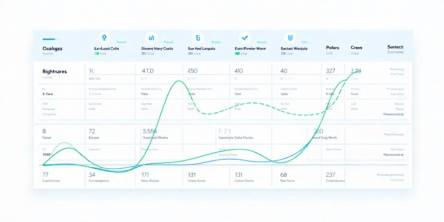How Flutter Is Transforming the Mobile App Development in 2021?

Are you looking to launch your mobile app in 2021 but confused about which cross-platform to leverage? You can choose Flutter without a second thought. It helps you roll out feature-rich applications without burning a hole in your pocket.
We all know that plenty of new apps are getting added with each passing day. There are about 2.7 million apps in Google Play Store and 1.84 Million apps available in Apple's app store. How will you ensure that your app performs so well that your target audience likes it in such a cutthroat competition?
Flutter is one such cross-platform SDK that will help you develop function-rich hyper-performing and secured applications. Flutter is a part of Google's long-term vision of creating interactive content using only a few lines of code.
Mr Matias Duarte, Google, VP of Design, once tweeted "Google is committed to making our digital worlds more usable, beautiful, delightful. Not just for ourselves, but Google wants to help you bring the worlds of your imagination to digital reality."
Having said that, you must be wondering, despite having so many app development platforms in 2021 why should I go for Flutter? How is Flutter transforming the mobile app development world?
In this blog, we're going to cover these questions. So, read it till the end!
What is Flutter?
Flutter is an open-source Software Development Kit (SDK) launched by Google to develop robust, scalable, and high-performing mobile apps for multiple operating systems by using a single codebase.
Flutter is a complete UI kit that allows developers to develop high-scale applications with the best typography, icons, and scrolling behaviors.
Flutter is based on Google's in-house language Dart, so developers familiar with Java or JavaScript can quickly learn and understand this language. Apart from this, Flutter offers you excellent community support and tutorial guides; therefore, mobile app developers with any level of experience can get started with this platform without any hassle.
Flutter is an open-source software development kit (SDK) rolled out by Google to develop scalable, seamless, robust mobile apps for different operating systems by using one codebase. It enables developers to develop hyper-performing applications with best-in-class features and functionalities, typography, icon, and scrolling behaviors.
Moreover, Flutter is based on Google's in-house language Dart, so developers well versed with languages such as Java or JavaScript can quickly learn and understand this language.
Flutter also offers community support and tutorials so that mobile app developers can quickly learn to get started on this platform.
How Flutter is transforming the app development world?
1. Hot Reload Feature
The best part of Flutter is its hot reload feature that offers developers to quickly and easily experiment with different codes, build user interface at features and functionalities and find bugs in their codes in real-time. The hot reload feature instantly reflects the changes you made in coding without having to change the code right from the beginning. This saves the time and efforts of the developers as they don't have to rewrite the code from scratch. Along with this, Hot reload helps you see the changes you're doing in the code in real-time and allows you to continue with writing and executing codes in real-time.
2. Flutter Is An Open Source Platform
We all know that Flutter is an open-source platform. Hence, when you develop your app with Flutter, you can easily turn your ideas into reality by leveraging the built-in and beautiful material design, including rich motion APIs, smooth scrolling behavior, widgets and so on. Since the platform is open-source, developers can explore numerous ways to develop an app with Flutter.
3. Flutter Widget Catalogues
When you develop an application, your topmost concern is its performance. Flutter has all the fantastic widgets, which ensures close to the native performance of an application. The exhaustive catalog of Flutter's widget, including icons and fonts, navigations, scrolling, etc., provides seamless mobile app development. This is a primary reason why top companies build mobile apps will Flutter.
4. Multiple Operating Systems With Single Code Base
When you build your mobile application using Flutter, stay assured that you don't have to develop two different applications for android and iOS. Developers just have to write one single-core base to build hyper-performing applications for both operating systems that behave like a native app-like feature, UI/UX, and functionality. You can even change the logos, button, pixels, etc on a real-time basis. Also, Flutter can be deployed on both platforms, which reduces the load of the quality assurance people as they only have to ensure the quality on one app.
Are You Using Flutter for Mobile App Development?
With millions of apps getting launched every day, it's important for you to stand apart in order to create a niche for yourself. If you're planning to launch an app in 2021 and want to do that without burning a hole in your pocket, you must consider a cross-platform app development framework like Flutter. It helps you develop an app for all operating systems
with a single codebase. Flutter has been rolled out by Google and has an enormous potential to develop robust apps that behave natively.
Similar Articles
Modern businesses are drowning in communication overload, and much of that burden stems from outdated tools that simply can’t keep up
Building lending software isn’t just a technical project—it’s a business decision. Whether you're a fintech founder or part of a traditional lending institution trying to go digital, three questions will shape everything that follows
Learn why robust security is crucial for super app development. Explore key strategies and best practices for mobile app development security.
Walkie-talkies with an extensive reception capacity have changed significantly when it comes to portable communication by displaying cutting-edge features with seamless connectivity that covers more than just the state
USB-C technology has revolutionized the way we charge our devices, offering faster charging speeds, higher power delivery, and universal compatibility across multiple devices
Discover expert mobile app development strategies to create a viral app that attracts users and boosts engagement
Optimize app localization for iOS users across the EU with language, cultural, and regulatory adaptations. Engage users and boost retention with these tips!
Discover the top 10 mobile app development trends of 2024! Explore 5G, AI, AR/VR, blockchain, and more to stay ahead in the ever-evolving app development landscape.
With its triple-lens design and fantastic photo and video quality, the iPhone 11 Pro Max is extensively acknowledged for its superior camera system. But problems can occur with also one of the most advanced technologies. If you're having issues with the iPhone 11 pro max camera lens, knowing the typical problems and how to repair them









